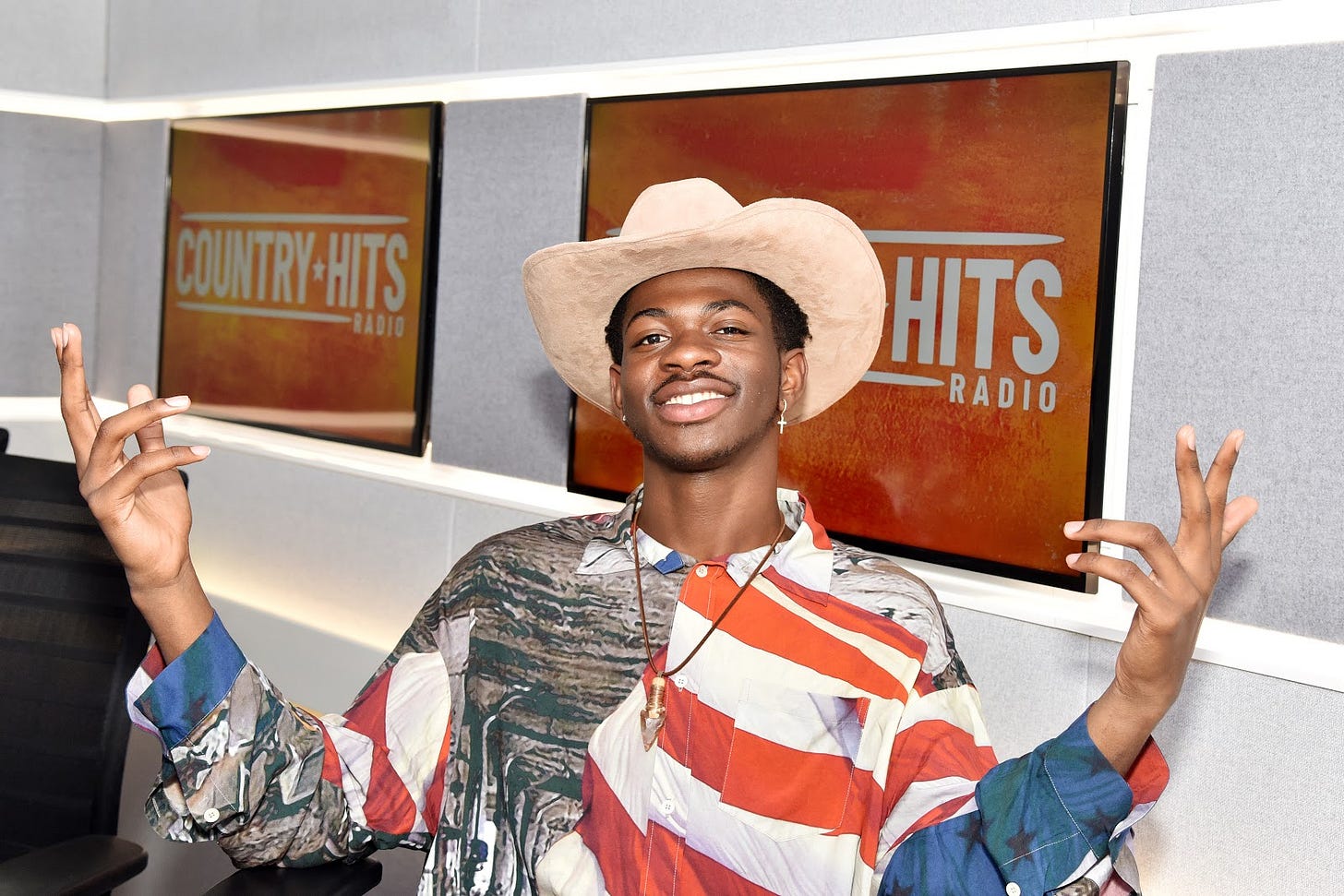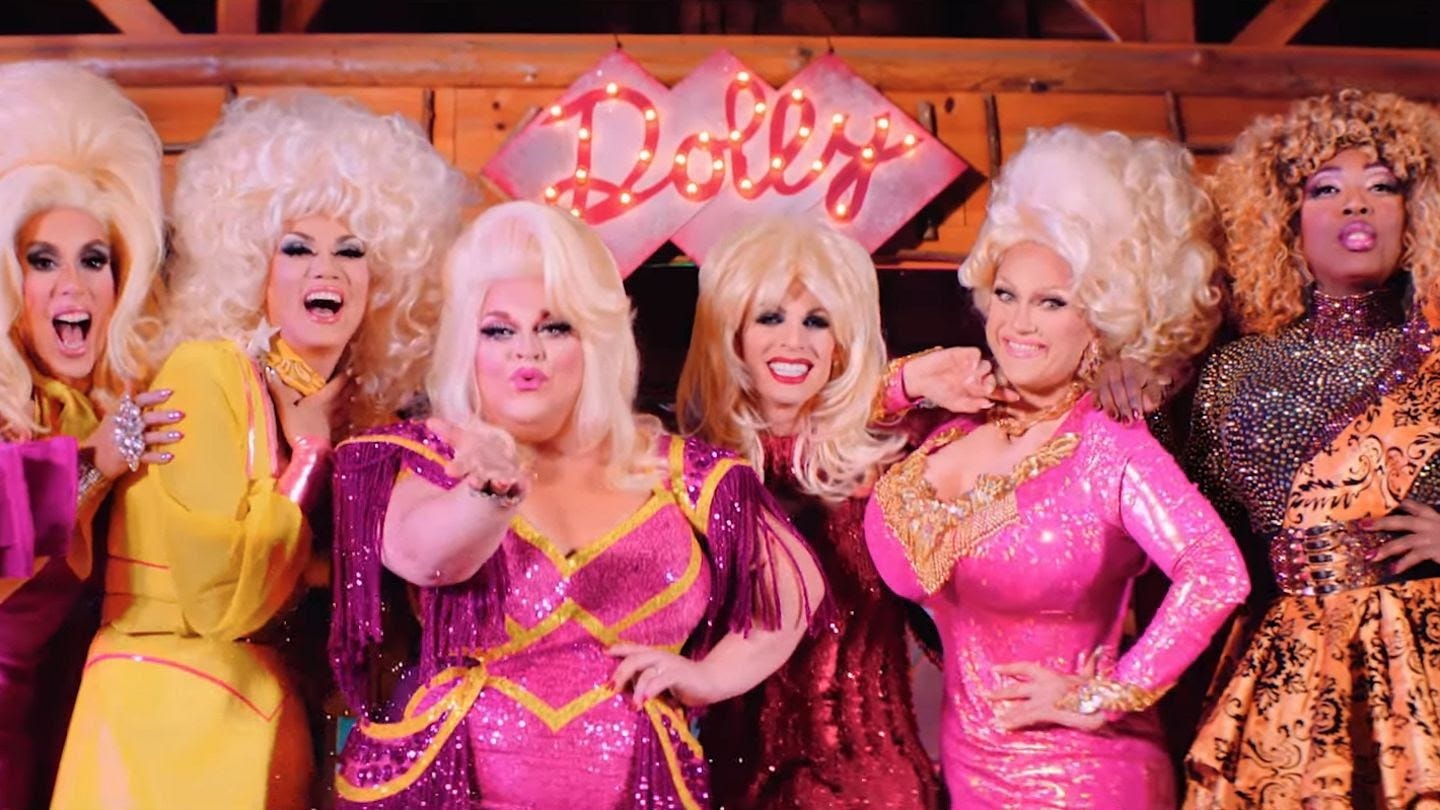'The Daughters of Dolly' and the Limits of Our Racial Imagination
The limit of drag's radical subversion + a surprising heir to Dolly's throne
This week’s newsletter wonders just how subversive drag is when it comes to the most pernicious of all social constructs: race. I also invite you to sign up for the first essaying Live event with Jessie Wilkerson and share one of my favorite ways to procrastinate. It is a call for help. You know the deal by now: share, subscribe, comment, roll your eyes as you see fit.
One of the most fascinating discussions that arose from my research on the Dolly essay did not make it into the Dolly essay.
Charles Hughes is a lecturer, essayist, and the director of the Lynne and Henry Turley Memphis Center at Rhodes College. His research centers on the music of the South and the history of Memphis. His book, Country Soul: Making Music and Making Race in the American South, was one of the books I used to read around Dolly.
I have wanted to talk to Charles for a while. Our chat did not disappoint. After hooting it up for a good long time about the confederacy, memorialization, Stax records, and Memphis holes-in-the-wall, I asked Charles why Dolly never had her “soul” period. (This also came up in the Open Discussion Thread for subscribers, by the way.)
Dolly doesn’t do R&B or soul. There is no R&B period, not even a gospel crossover album. Her music has some soul influences, especially during her disco phase. This lack does not reflect anything about Dolly’s racial attitudes. The lack is interesting for how we do not think about it much, if at all. The culture intuitively understands her genre as being inherently white, even as we proclaim (too loudly, perhaps) that we love Dolly for her diversity.
Just as interesting is how Dolly’s drag performance carved out a space for Dolly—which is subversive—but did not carve a path for women and non-binary country artists who followed her. When I asked Charles about this, he restated my question as, “You mean, who are the daughters of Dolly?,” which was perfect framing.
The framing was so perfect that I put the question to Rissi Palmer when we spoke. Rissi has a deep encyclopedic knowledge of contemporary female country stars. She also thinks about their place in the culture in a way that is similar to how I analyzed Dolly Parton. Palmer runs through some of the names you are probably thinking of:
No. No. You know what's funny? Out of all the artists that everybody mentions on my show [Color Me Country] that influenced them no one has ever said [Carrie Underwood]. I get Shania. I get Taylor Swift. I get Dolly. And I even get like older women like we get a lot of Loretta Lynn but no I've never had anybody say Carrie which is interesting to me because kids are old enough now that she would have [been an option].
You know Kelly Clarkson but she's not like a big star but Kelly... Yeah Kelly gives me Dolly tease but she hasn't come all the way over to the dark side to do a country album yet. I think it's coming. It should at this point but like... I thought so too. Reba [McEntire] kind of, but Reba doesn't write.
When I was analyzing these interview transcripts, I thought again about the contenders for Dolly’s crown: Carrie, Kelly, Taylor, Reba, Shania. I realized that none of them had the thing that ultimately makes Dolly Parton an overtly political figure: drag. None of today’s “girl singers” have crafted as sophisticated a drag as Dolly.
I wrestled with the subversiveness of Dolly’s drag. It certainly provides a critique of gender and class. But I could not get over why that drag did not, well, liberate. I parsed this as the difference between subverting an oppressive stereotype and revolutionizing the oppression that stereotypes. Dolly may subvert, but does she revolutionize?
The proof is in the pudding, as we might say. There is a clear color line in Dolly drag performances. Apparently, we know Dolly is for cosplaying whiteness even if we have never thought about it. For as much as drag has expanded our repertoire on gender and sexuality, mainstream drag deflates when it approaches the boundaries of our racial imagination. If a drag performance subverts a gender stereotype by reifying a racial stereotype, just how radical can it be? I still do not have a satisfactory answer to that question but thinking about the revolutionary capacity of Dolly’s white, trashy drag pushed me into a surprising space of discovery.
On the issue of Dolly, if her infamous drag was revolutionary, we should expect to see a whole lot more women in country music building on Dolly’s archetype. But Charles and I couldn't think of many … until he hit on the most unlikely of suspects. As I wrote in an earlier draft, the idea blew me away:
For all of Dolly’s subversive resistance and survival in country and pop culture, it is a path carved uniquely for her ambitions and charms. Subverting boundaries is one thing—and not a small thing at that. But revolutionizing those boundaries is altogether something else, something more. Subversion may inspire others to do the same, but it does not necessarily create a lane for them to do so. I ask Charles Hughes about Dolly’s trailblazing and who benefits from it. “You mean, who are the daughters of Dolly?,” he asks in response. It was hard to imagine Dolly’s heirs. Carrie Underwood is too bland and not a songwriter. Miranda Lambert is too rebellious and cannot be consumed ironically. Hughes and I cycled through many of country’s biggest stars until it hit us that we were assuming Dolly’s heirs would have to be blonde. Which was rather to the point: Dolly’s drag is so integral to her subversion that we could not imagine a radical heir of her legacy who wasn’t also a blonde woman. Once we rid ourselves of that latent conceit, Kacey Musgraves seemed as likely an heir as anyone in the industry today. She is a songwriter with a clear creative point of view. Her drag, while being a brunette instead of blonde, embraces the camp aspects integral to Dolly’s version. Musgraves has also demonstrated an impulse to tackle social class and gender in her music. Similar to Dolly, that difference is enough to stand out as radical in country music that it shields the work from questions about its racial politics.
Two things happened when I thought about the drag element of Dolly’s cultural power. First, I was finally able to articulate why Dolly’s persona narrowed the potential heirs in my mind. I was only thinking in blonde because Dolly is A Blonde among All Blondes. I was also thinking of someone white, because, well for the same reasons. That lead to the read of power and whiteness. Second, I was finally able to lift those unspoken filters from my mental search parameters. When I did, I could see what Hughes saw when I interviewed him:
Then Hughes offers up one more possible Daughter of Dolly that sets both of us back on our heels: Lil Nas X. A country-music outsider, Nas X wrangled a seat at country music’s table through sheer fan power in 2018. He is Black, queer, and young—three things that mainstream country music cannot process as a legible subject, much less as a legitimate industry member. Nas X has not shown much interest in following up his country music smash hit, “Old Town Road,” with a strategic takeover of the industry. Still, his overnight success in the genre and its discourse for two years—at the height of Trumpism and the nation’s search for a white body to save the South for safe consumption—was a delightful fly in the ointment. Hughes points out something else about Nas X that is very Dolly-like: “I have never seen anyone so joyful, who brings so much joy to others, during his country music performances.” Combined with Nas X’s full embrace of camp and of the gay and queer cultures that have elevated camp into political art, Lil Nas X takes Dolly’s ambitions from subversive into the realm of revolutionary.
It is unlikely that Lil Nas X wants to become a country-music legend, but someone like him most certainly does. What made Nas X fascinating and troubling for country music is exactly what will revolutionize the strictures of genre and Southern nostalgia that made Dolly Parton possible.

I love Lil Nas X. I absolutely adore him. I am close to the point where I do not trust anyone who does not adore him. Nas X’s story is as authentic as Dolly’s, if retrofitted for our current socio-political moment. He broke into a very white, very conservative media industry wielding chutzpah and the internet. He also happened to make one of the hottest pop songs of 2019 for something like $100. And his performance rings with infectious joy. I love the idea of Nas X as the heir to Dolly’s crown. If you missed his major ad during this year’s Grammy Awards, it is worth checking out. If you are feeling really ambitious, you can trace Nas X’s hero monomyth in this ad using the one Dolly creates in her classic, “Coat of Many Colors.” No one else in all of mainstream country music even comes close.
Etcetera
If you haven’t already done so, be sure to sign up for our essaying live event with Jessie Wilkerson. Subscribers got first crack at signing up last week and they reserved about 75% of the available slots. It is free to join us but slots are limited because we are still testing how much capacity we should pay for. Zoom is wildly expensive.
There are also great questions in the subscribers’ ODT about loss, unionization in the South, and how to talk to children about whiteness. I have some questions about writing about your celebrity crushes and why we do not want to think of Dolly as a rich white lady. Subscribers can submit their questions and access the event archive.
Speaking of Rissi Palmer, she is having one hell of a month. Country music is feeling very racist and this woman has earned her flowers. Not only was Rissi back at The Opry this week but my mother, The Vivian, texted me a screenshot from Rissi’s Good Morning America appearance.
I am working on our next newsletter, which is another essaying type: the “what I am writing when I should be writing something else” essay. I should be writing about higher education reforms after COVID but all I wanted to think about this week was how I have struggled to become a fat, middle-aged, flat-footed athlete. That’s what I am writing about right now instead of writing what I should be writing. There are more dangerous forms of procrastination but only just barely…







Loved this essay! In the first list of potential successors, I thought, "What about Kacey?!" but kept reading. Kacey does not feel as...mysterious, I guess, as Dolly does because she is removed from the core country radio audience and appeals to the political sensibilities of pop audiences in ways others have not until they are legacy acts (appearing on Drag Race, for example). The talk of an "heir" brought up a challenge for Dolly stans similar to those of her class politics: does Dolly not have an industry daughter in part because, despite her cultivated benevolent image, she does not envision developing opportunities with/for marginalized folks as a necessary or lucrative part of her legacy? Clearly she can create whatever legacy suits her, but the absence may be telling. Also, Dr. McMillan Cottom, I know you said you are avoiding this (and I am avoiding work by rambling here), but I am pumped to read your thoughts on post-COVID higher ed. Looking forward to the live event!
I procrastinated my inbox and missed the chance to sign up for the live event (which I'm sure will be great!), but it also means I didn't read this piece until after the debut of lil nas x's latest video, so he was on my mind when thinking about unconventional heirs to dolly. I'm not familiar with his deep catalog, but this convo leaves me hoping he does keep up the genre blending